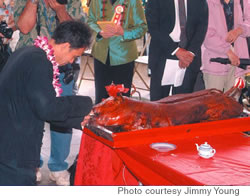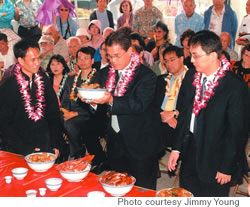Lunch With The Ancestors
You’ll never have a better time in a cemetery than at the Chinese festival Qing Ming, which makes ancestors the guests of honor at a feast

By .(JavaScript must be enabled to view this email address)
E-mail this story | Print this page | Archive | RSS

Keith Lim cuts a piece of the pig for the offering
incense, and then a final explosion of fireworks.
“The purpose of Qing Ming is to respect our ancestors, and a legacy which we have to follow,” says Jimmy. “It’s a time for families to gather and have a picnic with their ancestors. Ever since we were young, we would come up to the cemetery. My parents, Mr. and Mrs. Young Kee Nam, and my brother are here. And so, after death, you respect them by visiting the cemetery forever.”
Before he passed, George Young wrote a report on Qing Ming, explaining the purpose and the step-by-step process of the celebration.
At the Manoa Chinese Cemetery, festivities are held before the Tai Kung Shan, where one of its founders, Lum Ching, is buried.
Flower and paper banners are placed on each headstone and anchored down with a stone or clod of earth. And chopsticks with brown resin tips are thrust into the ground to the right of the incense and candles as memorial markers to show that the grave has been visited by filial descendants paying their respect.
Long longevity incense sticks as well as smaller incense are lit and placed on the grave, acting as a messenger to awaken the ancestors’ souls, and red Chinese candles are lit to create a passage of communication.

(from left) Keith Lim, Leslie Young and Cy Feng
make an offering to the ancestors at last year’s
Qing Ming celebration
Prepared for the ancestors is a five-course banquet which usually includes fish, chicken and pork, stewed oysters, tofu, shrimp, mushrooms, duck eggs, roast pork and duck.
There are also five cups of tea, liquor and rice and five pairs of chopsticks.
The selection of food is important, as the Chinese believe that foods hold symbolic meanings. For example, the pork is the sacrifice for the Pig Demon of the underworld “who has control over the release of the souls of the deceased who are paying their debts to the different realms of the nether world.”
Also, oysters represent good news or blessings, tofu means abundant wealth, and duck eggs are symbolic of the yin and yang principles of universal life.
On the right side of the grave, a small altar is set up with incense, candles, and food for the keeper of the graves.
Once everything is in order, family members (starting with the oldest member, then the oldest males, and then the females) pay their respects by bowing three times and offering paper money of gold and silver.
“Qing Ming, which means bright, is more than an annual visit to the cemetery,” says Jimmy Young.
“It is a time for Chinese families to reaffirm their commitment to the family traditions And it is a time for the younger people to learn the practice so that they too, can carry on the tradition with their own children.
“The future is indeed bright for the perpetuation of the observance of Qing Ming to be carried on for many more generations.”
Page 2 of 2 pages for this story < 1 2
E-mail this story | Print this page | Comments (0) | Archive | RSS
Most Recent Comment(s):








